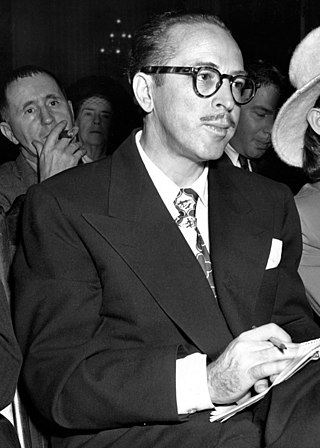
James Dalton Trumbo was an American screenwriter who scripted many award-winning films, including Roman Holiday (1953), Exodus, Spartacus, and Thirty Seconds Over Tokyo (1944). One of the Hollywood Ten, he refused to testify before the House Un-American Activities Committee (HUAC) in 1947 during the committee's investigation of alleged Communist influences in the motion picture industry.
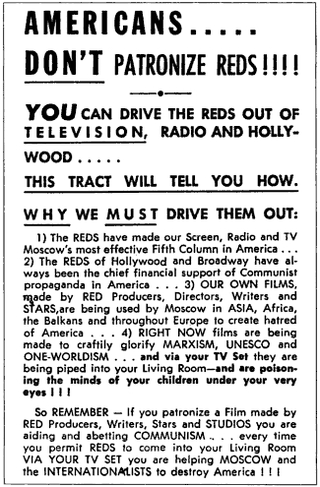
McCarthyism, also known as the Second Red Scare, was the political repression and persecution of left-wing individuals and a campaign spreading fear of communist and Soviet influence on American institutions and of Soviet espionage in the United States during the late 1940s through the 1950s. After the mid-1950s, U.S. Senator Joseph McCarthy, who had spearheaded the campaign, gradually lost his public popularity and credibility after several of his accusations were found to be false. The U.S. Supreme Court under Chief Justice Earl Warren made a series of rulings on civil and political rights that overturned several key laws and legislative directives, and helped bring an end to the Second Red Scare. Historians have suggested since the 1980s that as McCarthy's involvement was less central than that of others, a different and more accurate term should be used instead that more accurately conveys the breadth of the phenomenon, and that the term McCarthyism is, in the modern day, outdated. Ellen Schrecker has suggested that Hooverism, after FBI Head J. Edgar Hoover, is more appropriate.
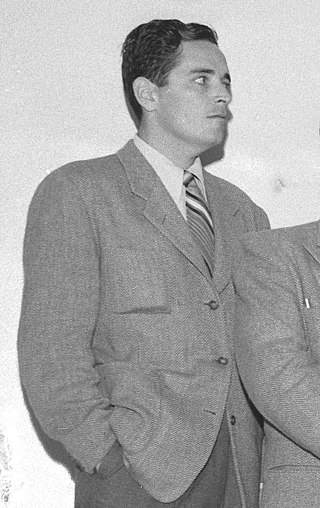
Ringgold Wilmer Lardner Jr. was an American screenwriter. A member of the "Hollywood Ten", he was blacklisted by the Hollywood film studios during the late 1940s and 1950s after his appearance as an "unfriendly" witness before the House Un-American Activities Committee (HUAC) leading to Lardner being found guilty of contempt of Congress.

Joseph Walton Losey III was an American theatre and film director, producer, and screenwriter. Born in Wisconsin, he studied in Germany with Bertolt Brecht and then returned to the United States. Blacklisted by Hollywood in the 1950s, he moved to Europe where he made the remainder of his films, mostly in the United Kingdom. Among the most critically and commercially successful were the films with screenplays by Harold Pinter: The Servant (1963) and The Go-Between (1971).

Edward Dmytryk was a Canadian-born American film director and editor. He was known for his 1940s noir films and received an Oscar nomination for Best Director for Crossfire (1947). In 1947, he was named as one of the Hollywood Ten, a group of blacklisted film industry professionals who refused to testify to the House Un-American Activities Committee (HUAC) in their investigations during the McCarthy-era Red Scare. They all served time in prison for contempt of Congress. In 1951, however, Dmytryk testified to the HUAC and named individuals, including Arnold Manoff, whose careers were then destroyed for many years, to rehabilitate his own career. First hired again by independent producer Stanley Kramer in 1952, Dmytryk is likely best known for directing The Caine Mutiny (1954), a critical and commercial success. The second-highest-grossing film of the year, it was nominated for Best Picture and several other awards at the 1955 Oscars. Dmytryk was nominated for a Directors Guild Award for Outstanding Directorial Achievement in Motion Pictures.
Robert Adrian Scott was an American screenwriter and film producer. He was one of the Hollywood Ten and later blacklisted by the Hollywood movie studio bosses.

Red Channels: The Report of Communist Influence in Radio and Television was an anti-Communist document published in the United States at the start of the 1950s. Issued by the right-wing journal Counterattack on June 22, 1950, the pamphlet-style book names 151 actors, writers, musicians, broadcast journalists, and others in the context of purported Communist manipulation of the entertainment industry. Some of the 151 were already being denied employment because of their political beliefs, history, or association with suspected subversives. Red Channels effectively placed the rest on a blacklist.
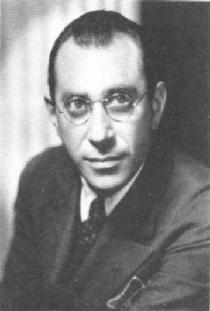
Herbert J. Biberman was an American screenwriter and film director. He was one of the Hollywood Ten and directed Salt of the Earth (1954), a film barely released in the United States, about a zinc miners' strike in Grant County, New Mexico. His membership in the Directors Guild of America was posthumously restored in 1997; he had been expelled in 1950.

The Committee for the First Amendment was an action group formed in September 1947 by actors in support of the Hollywood Ten during the hearings of the House Un-American Activities Committee (HUAC). It was founded by screenwriter Philip Dunne, actress Myrna Loy, and film directors John Huston and William Wyler.
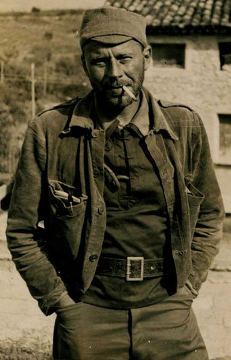
Alvah Cecil Bessie was an American novelist, journalist and screenwriter who was blacklisted by the movie studios for being one of the Hollywood Ten who refused to testify before the House Un-American Activities Committee. He was a member of the Communist Party USA and participated in paramilitary activity as part of the Comintern's International Brigades during the Spanish Civil War.

Lester Cole was an American screenwriter. He was one of the Hollywood Ten, a group of screenwriters and directors who were cited for contempt of Congress and blacklisted for their refusal to testify regarding their alleged involvement with the Communist Party.
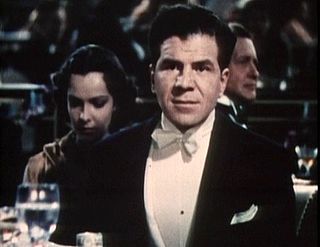
Lionel Jay Stander was an American actor, activist, and a founding member of the Screen Actors Guild. He had an extensive career in theatre, film, radio, and television that spanned nearly 70 years, from 1928 until 1994. He was known for his distinctive raspy voice and tough-guy demeanor, as well as for his vocal left-wing political stances. One of the first Hollywood actors to be subpoenaed before the House Un-American Activities Committee, he was blacklisted from the late 1940s until the mid-1960s.
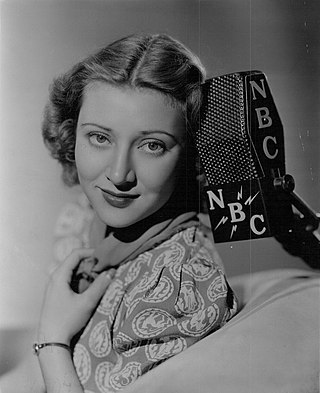
Jean Rouverol was an American author, actress and screenwriter who was blacklisted by the Hollywood movie studios in the 1950s.
Bartley Crum was an American lawyer who became prominent as a member of the Anglo-American Committee of Inquiry, his book on that experience, and for defending targets of HUAC, particularly the Hollywood Ten and Paul Robeson.
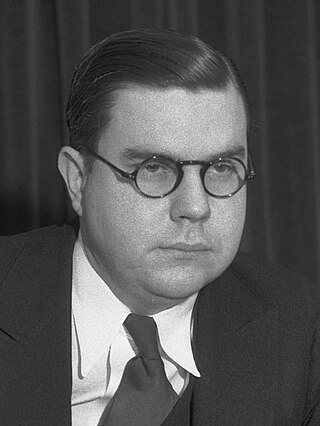
Robert Walker Kenny, 21st Attorney General of California (1943-1947), was "a colorful figure in state politics for many years" who in 1946 ran unsuccessfully against Earl Warren for state governor.
Gordon Kahn (1902–1962) was an American writer and screenwriter who was blacklisted during the McCarthy era; he is the father of broadcaster and author Tony Kahn.
Ben Barzman was a Canadian journalist, screenwriter, and novelist, blacklisted during the McCarthy Era and known best for his screenplays for the movies Back to Bataan (1945), El Cid (1961), and The Blue Max (1966).
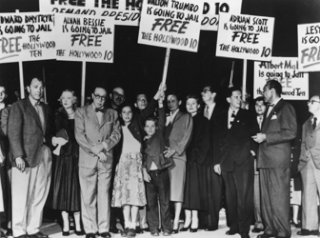
The Hollywood blacklist was an entertainment industry blacklist in the mid-20th century in the United States. The blacklist began at the onset of the Cold War and Red Scare, and affected entertainment production in Hollywood, New York, and elsewhere. Actors, screenwriters, directors, musicians, and other film and television professionals were barred from work based on their present or past membership in, alleged membership in, or perceived sympathy with the Communist Party USA (CPUSA), or on the basis of their refusal to assist Congressional or FBI investigations into the Party's activities.

The House Committee on Un-American Activities (HCUA), popularly the House Un-American Activities Committee (HUAC), was an investigative committee of the United States House of Representatives, created in 1938 to investigate alleged disloyalty and subversive activities on the part of private citizens, public employees, and those organizations suspected of having communist ties. It became a standing (permanent) committee in 1946, and from 1969 onwards it was known as the House Committee on Internal Security. When the House abolished the committee in 1975, its functions were transferred to the House Judiciary Committee.
Martin Berkeley was a Hollywood and television screenwriter who cooperated with the House Un-American Activities Committee (HUAC) in the 1950s by naming dozens of Hollywood artists as Communists or Communist sympathizers.














